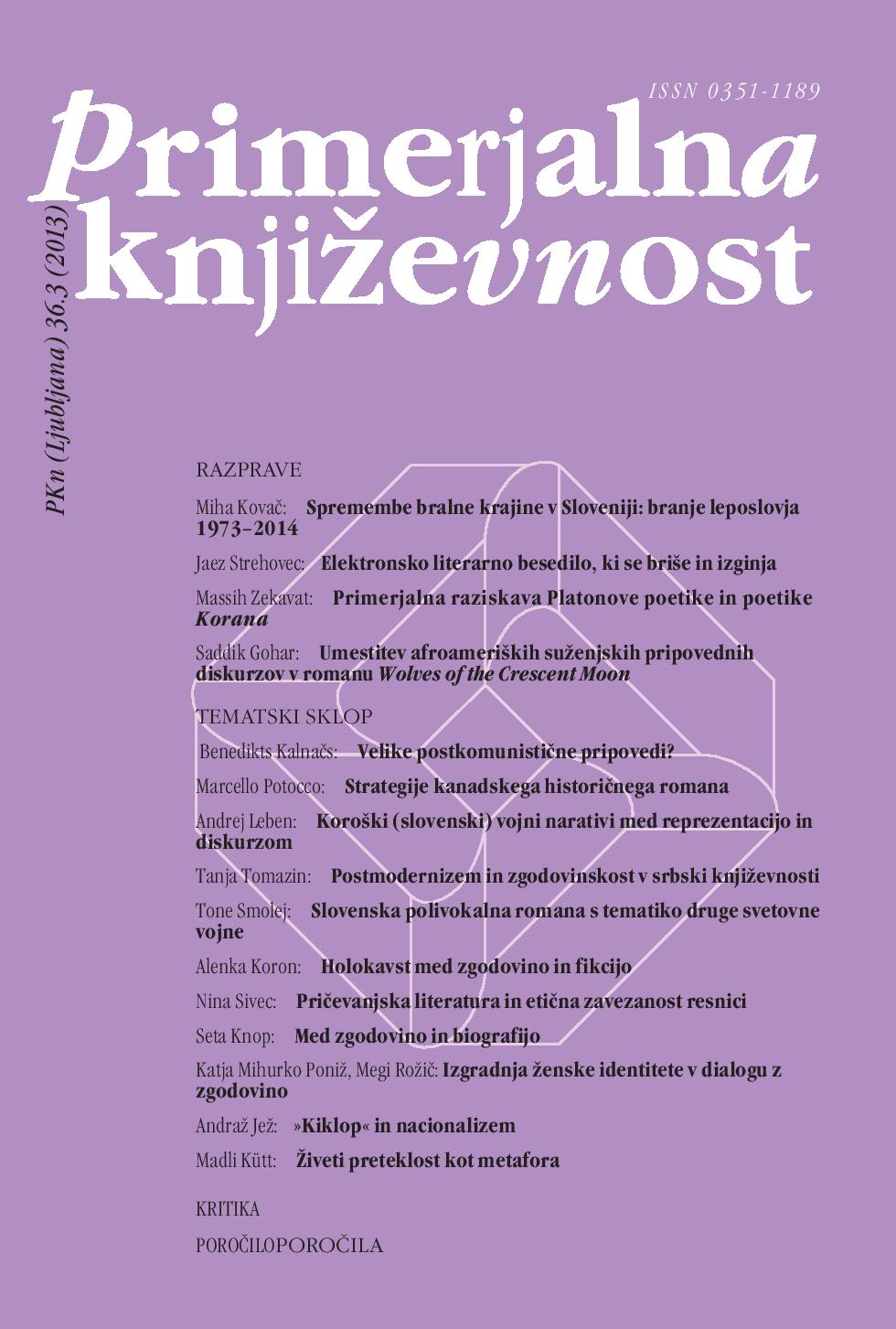The Construction of Female Identity in Dialogue with History: Krese, Pirjevec, Wolf
Keywords:
literature and history, Slovenian literature, Krese, Maruša, Pirjevec, Nedeljka, German literature, Wolf, Christa, World War II, literary characters, women, identityAbstract
The article presents a comparative analysis of two Slovenian novels, Nedeljka Pirjevec’s Saga o kovčku (The Saga of the Suitcase) (2003) and Maruša Krese’s Da me je strah? (That I Am Afraid?) (2012), and a German novel, Christa Wolf’s Nachdenken über Christa T. (Thinking About Christa T.) (1968). All three novels share a common preoccupation with the processes of identity construction of the female protagonists, set against the backdrop of the historical events of World War II, the post-war reality of communist ideology and the socialist system, as well as similarities on the plot and narrative level. Literary texts featuring female protagonists in the chronotope of World War I and II not only depict monumental historical events, but also single out women as active participants in these events, while thematising and problematizing traditional gender roles. They challenge old dichotomies of public versus private, subject versus object of history, and definitions of femininity and masculinity, and assert that no sharp dividing lines exist between them. Women in the selected works become active witnesses of historical events, recounting them from direct experience. Their experience, however, is different from that of men. The novels engage in a dialogue with history on both the narrative and story/thematic level. They create a polyphony of narrative voices, a multiperspectivity and a technique of remembering. By employing these techniques, writers endeavour to prevent history and those who have lived it from being forgotten. The protagonists are embedded in a historical moment that allows them to experience a new identity, yet this selfsame historical moment can at the same time also limit them significantly.References
Baron, Ava. »On Looking at Men. Masculinity and the Making of a Gendered Working-Class History«. Feminists Revision History. Ur. Ann-Louise Shapiro. New Brunswick, NJ: Rutgers University Press, 1994. 146–171.
Braidotti, Rosi. Nomadic Subjects: Embodiment and Sexual Difference in Contemporary Feminist Theory. New York: Columbia University Press, 1994.
Clausen, Jeanette. »The Difficulty of Saying ‘I’ as Theme and Narrative Technique in the Works of Christa Wolf«. Amsterdamer Beiträge zur neuen Germanistik 10 (1980): 319–333.
Donaldson, Susan V. »Gender and History in Eudora Welty’s Delta Wedding«. South Central Review 14.2 (1997): 3–14.
Drescher, Angela (ur.). Christa Wolf. Ein Arbeitsbuch. Studien – Dokumente – Bibliographie. Berlin, Weimar: Aufbau-Verlag, 1989.
– – – (ur.). Dokumentation zu Christa Wolf: Nachdenken über Christa T. München: Luchterhand, 1991.
Durzak, Manfred. Der deutsche Roman der Gegenwart. Stuttgart: W. Kohlhammer, 1971.
Gilbert, Sandra M. »Soldier’s Heart: Literary Men, Literary Women, and the Great War«. Behind the Lines. Gender and the Two World Wars. Ur. Margaret Randolph Higonnet, Jane Jenson, Margaret Collins Weitz. New Haven in London: 1987. 197–226.
Higonnet, Margaret R. »Introduction«. Behind the Lines. Gender and the Two World Wars. Ur. Margaret Randolph Higonnet, Jane Jenson, Margaret Collins Weitz. New Haven in London: 1987. 1–18.
Hildebrandt, Irma. Warum schreiben Frauen? Befreiungsnotstand, Rollenhader, Emanzipation im Spiegel der modernen Literatur. Freiburg im Breisgau, Basel, Dunaj: Herder, 1980.
Hilzinger, Sonja. Christa Wolf. Stuttgart: Metzler, 1986.
Hladnik, Miran. Slovenski zgodovinski roman. Ljubljana: Znanstvena založba Filozofske fakultete, 2009.
Hrastelj, Stanka. »Partizanski prapori in Antigona«. V: Maruša Krese. Da me je strah? Novo mesto: Goga, 2012. 188–201.
Klasson, Vera. Bewußtheit, Emanzipation und Frauenproblematik in Der Geteilte Himmel und drei weiteren texten von Christa Wolf. Göteborg: Acta Universitatis Gothoburgensis, 1991.
Lauretis, Teresa de. Alice Doesn’t. Feminism, Semiotics, Cinema. Bloomington: Indiana University Press, 1984.
Love, Myra N. Christa Wolf. Literature and the Conscience of History. New York: Peter Lang, 1991.
Mohr, Heinrich. »Produktive Sehnsucht, Struktur, Thematik und politische Relevanz von Christa Wolfs Nachdenken über Christa T.« Christa Wolf. Ein Arbeitsbuch. Studien – Dokumente – Bibliographie. Ur. Angela Drescher. Berlin, Weimar: Aufbau-Verlag, 1989. 32–62.
Krese, Maruša. Da me je strah? Novo mesto: Goga, 2012.
Lanser, Susan S. Fictions of Authority: Women Writers and Narrative Voice. Ithaca, London: Cornell University Press, 1992.
Novak Popov, Irena. »Štiri ženske avtobiografije«. Jezik in slovstvo 53.3/4 (2008): 53–67.
Nünning, Ansgar, Vera Nünning (ur.). Multiperspektivisches Erzählen: zur Theorie und Geschichte der Perspektivenstruktur im englischen Roman des 18. bis 20. Jahrhunderts. Trier: Wissenschaftlicher Verlag Trier, 2000.
Pirjevec, Nedeljka. Saga o kovčku. Ljubljana: Nova revija, 2003.
Poniž, Denis. »Z ljubeznijo prežarjeni spomin«. V: Nedeljka Pirjevec. Saga o kovčku. Ljubljana: Nova revija, 2003. 353–375.
Shapiro, Ann-Louise. »History and Feminist History, or Talking Back to Beadle«. History and Theory 31.4 (1992): 1–14.
Stephan, Alexander. Christa Wolf. München: Beck, 1991.
Wolf, Christa. Lesen und Schreiben. Aufsätze und Prosastücke. Weimar: Aufbau-Verlag, 1972.
Wolf, Christa. Premišljevanja o Christi T. Ljubljana: Prešernova družba, 1974.


